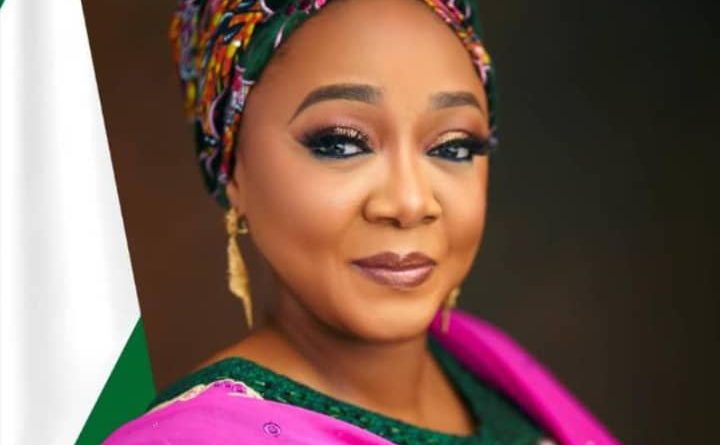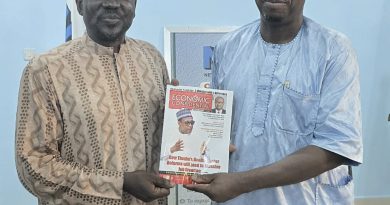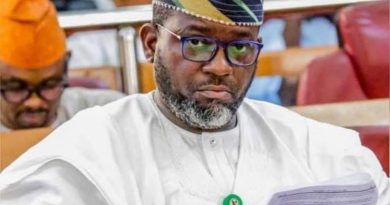Women Affairs Minister Decries Degeneration Of Nation’s Moral, Societal Values
By Bukar BOLORI
Saddens by Several Horrific Violations of Rights of Defenseless, Vulnerable Persons, the Minister of Women Affairs, Imaan Sulaiman-Ibrahim has, decried the degeneration of the country’s moral and societal values which have seen few months old baby being raped, a 2 year old girl stolen from her mother’s bed and raped by several men and other several horrific violations of the rights of the defenseless and vulnerable persons.
Speaking at the Opening Ceremony of the Knowledge-Enhancing Session on Gender-Based Violence with Faith-Based Organisations in Abuja organised by United Nations Women, the Minister said: “I am deeply troubled by the horrors I have witnessed during my travels across the country, as I listened, observed, and assessed the realities faced by women, children, and other vulnerable groups, I could not help but question how our societal values and moral responsibilities have so deeply weakened. I have seen few months old baby raped, a 2 year old girl stolen from her mothers bed and raped by several men and other several horrific violations of the rights of the defenseless and vulnerable that reflect deeper societal issues.
“Ladies and Gentlemen, I have stood face-to-face with trauma so profound that words and the bitter truth is that even as we gather here today, somewhere in this country, a girl is being raped, a young boy is being violated, and a woman is enduring some form of abuse or another. Our meetings do not halt the violence; it is relentless, and we must be intentional in our efforts to stop this scourge which threatens to destroy the very fabric of our being.”
She noted that: “At the core of this national emergency lies a breakdown in the sanctity of the family, the first community, the first school, the first place of worship. Family cohesion is the first and most fundamental firewall against GBV. When the family unit fails, society falters. Under the Renewed Hope Agenda of His Excellency, President Bola Ahmed Tinubu, GCFR, we are deliberately expanding the mandate of the Federal Ministry of Women Affairs to prioritize not only the protection of women and children but also the promotion of family cohesion, peaceful parenting, and intergenerational stability.”
She added that: “However, our mission cannot succeed without you, our faith leaders. You command deep moral authority. Your platforms reach into the heart of every Nigerian home. But we must also acknowledge, with humility and heartbreak, that some faith leaders have been implicated in the very violations we seek to end. The media has brought to light cases of young women and even children being abused by persons in positions of spiritual authority; a betrayal not only of the victims, but of the divine trust placed in our religious institutions.
“Permit me to emphasize that no clerical title, robe, or pulpit should shield wrongdoing. Faith-Based Organizations must rise to the highest standards of accountability, transparency, and protection. You must institute clear codes of conduct, survivor-sensitive redress mechanisms, and a zero-tolerance stance for abuse within your ranks. This is not an attack on faith; it is a defence of its sanctity.”
The Minister insisted that: “Beyond institutional reform, your role in shaping the national consciousness is irreplaceable. You are uniquely placed to: Promote the popularization of the Violence Against Persons Prohibition (VAPP) Act 2015 and the Child Rights Act (CRA) 2003 across your jurisdictions.
“Use your sermons and teachings to confront cultural norms that excuse or perpetuate violence amongst others.”
She disclosed that: “In line with the Renewed Hope Agenda, the Ministry is working assiduously to: Expand safe spaces, referral pathways, and trauma services for survivors of GBV through partnerships with the private sector.
“Work towards establishing a National Social Protection Agency to address the broader vulnerabilities of women, children, and families“And anchor family cohesion as a central pillar of social protection and national development.”
She asked them to let their places of worship and religious platforms become citadels of protection and moral clarity, stressing that: “Let us teach our communities that no faith condones abuse, no scripture justifies violence, and no tradition must override human dignity.”
Sulaiman-Ibrahim appealed to them: “Let us turn today’s conversation into tomorrow’s transformation. Together, we can build a Nigeria where faith uplifts, family unites, and no woman or child is left behind.”
Earlier, the UN Women Representative to Nigeria and ECOWAS, Ms. Beatrice Eyong, in her opening remarks, said: “As we gather here today, we are reminded that GBV remains one of the most persistent and devastating human rights violations globally. According to the World Health Organisation, nearly 1 in 3 women worldwide has experienced physical or sexual violence in her lifetime – most often at the hands of an intimate partner.
“In Nigeria, data from the 2018 National Demographic and Health Survey paints a grim picture. 30% of women aged 15 to 49 have experienced physical violence since age 15, and 9% have been subjected to sexual violence. Recent evidenceshows that the cases of GBV have grown beyond these statistics because of the violent conflict across the country, socio-economic downturns and slow recovery from COVID-19.”
She noted that: “Behind each statistic is a name, a face, a story. A young girl married off before her body is ready. A woman battered into silence in her own home. A survivor ridiculed for seeking justice. Across the country, the scars are visible; broken families, school dropouts, mental health trauma, and cycles of violence that continue across generations.”
Eyong while acknowledging that Nigeria has made significant progress with the passage of landmark laws like the Violence Against Persons Prohibition (VAPP) Act 2015 and the Child Rights Act 2003, she noted that “we must confront a hard truth: laws alone are not enough. The gap between legislation and local implementation, particularly in rural and traditional settingsremains wide.”
She appealed that: “Dear religious leaders, your participation here is not only timely — it is essential.
“Whether in churches or mosques, on pulpits or minbars, in homes or on the airwaves — your voices carry immense authority. You are custodians of moral values, spiritual guides, and trusted conflict resolvers. You shape social norms. You influence hearts and minds. And you can either sustain or challenge the deeply rooted gender inequalities that often enable violence.
“The scriptures of both Christianity and Islam teach the sanctity of life, the dignity of every human being, and the responsibility to protect the vulnerable. The Bible reminds us that “whatever you did for the least of these brothers and sisters of mine, you did for me” (Matthew 25:40). The Qur’an proclaims that “whoever kills a soul… it is as if he had slain mankind entirely” (Qur’an 5:32).”
She told that that: “This session is designed to support your work as spiritual leaders. It will provide faith-aligned tools, evidence, and community-tested strategies to help you preach, counsel, mediate, and lead in ways that promote dignity, justice, and nonviolence. It will also explore how religious institutions can serve as early warning systems and safe spaces for survivors to seek help.”
Eyong , however urged them that they should not let the gathering to be just another meeting, but a turning point — a moment when faith leaders unite across doctrines to say: enough is enough. Violence against women and girls is not ordained by God. It is a human failing, and it is within our power to change.




